Concilium Purpaidá: Difference between revisions
mNo edit summary Tag: 2017 source edit |
m (Text replacement - "lead to" to "led to") |
||
| (25 intermediate revisions by the same user not shown) | |||
| Line 1: | Line 1: | ||
{{wip}} | {{wip}} | ||
{{Infobox executive government | {{Infobox executive government | ||
| government_name = Concilium Purpaidá | | government_name = Concilium Purpaidá | ||
| Line 9: | Line 8: | ||
| date = | | date = | ||
| state = [[Urcea|Apostolic Kingdom of Urcea]] | | state = [[Urcea|Apostolic Kingdom of Urcea]] | ||
| address = [[Julian Palace]]<br>[[Urceopolis]] | | address = [[Julian Palace]]<br>[[Urceopolis (City)|Urceopolis]] | ||
| appointed = [[Chancellor and Temporary President]] | | appointed = [[Chancellor and Temporary President]] | ||
| leader_title = [[Procurator]] | | leader_title = [[Procurator]] | ||
| Line 17: | Line 16: | ||
| url = https://www.purpaida.urc/ | | url = https://www.purpaida.urc/ | ||
}} | }} | ||
The '''Concilium Purpaidá''' (lit. ''Purple Council'', commonly simply called "'''the Purpaidá'''") is the collective organizing body of [[Apostolic King of Urcea|His Most Christian Majesty]]'s Government of the [[Urcea|Apostolic Kingdom of Urcea]], composed of the [[Procurator]] and the [[Government of Urcea|Government]] Ministers, the senior most officials within the Urcean national bureaucracy. The Purpaidá is considered the Urcean equivalent of a {{wp|Cabinet (government)|cabinet}} and, taken together with its subordinate agencies and offices, is considered the ''de jure'' {{wp|executive branch}} of the [[Government of Urcea]] and is responsible for executing [[Consolidated Laws of HMCM's Kingdom and State|the Kingdom's laws]] and managing the public projects of the Kingdom. While most executive authority is exercised by the [[Procurator]], the Purpaidá is still largely responsible for the day-to-day administration of the affairs of state. The Procurator serves as the official head of the Purpaidá and is responsible for issuing "''Treasury Orders''" to its members, which are official directives related to the execution of the laws and administration of affairs of state. | |||
The Purpaidá serves as the Royal {{wp|Privy Council}} of the [[Apostolic King of Urcea|Apostolic King]] and his household, informing the King of the affairs of state. It is within this capacity that the Purpaidá originated and received its name; members of the Privy Council often wore purple (as a color of royalty) cockades to distinguish themselves at court and around [[Urceopolis (City)|Urceopolis]] as well as while executing authority on behalf of the King or making public appearances; the distinguishing cockade became well known and eventually the body became known by its present name, literally meaning the "Purple Council". | |||
The Purpaidá serves as the Royal {{wp|Privy Council}} of the [[Apostolic King of Urcea|Apostolic King]] and his household, informing the King of the affairs of state | |||
== | ==History== | ||
{{wip}} | |||
==Structure== | |||
While the historic role of the Purpaidá was that of {{wp|privy council}} to the [[Apostolic King of Urcea]], the accretion of its departments and agencies over time necessarily led to the expenditure of funds to support their activities, functionally placing the council under the direction of the Royal Treasury. As First Lord (or Lady) of the Treasury, the [[Procurator]] is the head of the Purpaidá. He or she oversees all ministries in an administrative sense and reports directly to the King. The Procurator convenes all meetings of the Purpaidá. | |||
Although the Concilium Purpaidá has met as a functionally single body for centuries, it exists as an amalgamation of several different legal bodies with the same personnel. The most prominent legal basis is that of Privy Council, while the most prominent functional basis is of the members of the Purpaidá as Lords of the Treasury. Together, the functions and powers of both bodies give the Purpaidá significant authority over both Kingdom-wide policy and the expenditure of funds necessary to implement those policies. | |||
===Appointments=== | |||
The members of the Concilium Purpaidá are nominated by the [[Chancellor and Temporary President]] of the [[Concilium Daoni]] and are almost always also members of the Daoni. The Daoni is responsible for confirming nominees by a majority vote. The members of the Purpaidá legally serve at the pleasure of the [[Apostolic King of Urcea]], but functionally resign their offices either when the party control of the Daoni changes or when they lose the confidence of the [[Chancellor and Temporary President]]. The two popularly elected [[Censor (Urcea)|Censors]] also sit on the Purpaidá but typically abstain from its proceedings unless an issue relating to their mandate as public morality regulators is discussed. | |||
===Procedure=== | |||
The | The members of the Purpaidá are appointed by the [[Concilium Daoni]], but they are nominally responsible to the [[Procurator]] as head of the Privy Council and Royal Treasury. Consequently, members of the Daoni require the ''imprimatur'' of the Procurator in order to issue a binding decree or regulations considered to be major in scope. If the Procurator refuses to issue one and issues a Treasury Order contrary to the Purpaidá minister's direction, the ministers can appeal to the [[Apostolic King of Urcea]], who has three options on how to respond: he can issue a "Writ of Compliance", ordering the Purpaidá member to follow the Procurator's direction; he can issue a "Writ of Correction", in which the Procurator must withdraw his Treasury Order, allowing the Purpaidá member to proceed on their own proposed course of action submitted to the King; or, the King can issue a "Writ of Dismissal", in which neither the Purpaidá member's proposal nor the policy designed by the Procurator may be followed and that an entirely new policy must be jointly devised by both the Minister and Procurator. | ||
== | ===Salary=== | ||
Unlike many other [[Occidental]] government Cabinets, members of the Purpaidá receive no salary. Historically it was anticipated that members of the {{wp|privy council}} were members of the wealthy landed aristocracy, and consequently no salary was needed to support their activities. In the [[Constitution of Urcea|constitutional period]], nearly all members of the Purpaidá have also been salaried members of the [[Concilium Daoni]]. In the rare cases where a Purpaidá member is not a Daoni member, they have typically either been independently wealthy or have been assigned a {{wp|No-show job|nominal public office or Ministry post}} aside from their primary position as Minister which will pay a salary equal to the pay afforded to members of the Daoni. | |||
==Current Purpaidá membership== | |||
{|class="sortable wikitable" style="text-align:center" | |||
|- align=center | |||
!scope=col width=250|Ministry | |||
!scope=col class="unsortable" |Image | |||
!scope=col |Incumbent | |||
!scope=col |Party | |||
!scope=col class="unsortable" |In office | |||
|- | |||
|[[file:ProcuratorSeal2.png|150px]]<br/>'''[[Procurator]]''' | |||
|[[File:Livio Iarnan Portrait Slim.png|130px]] | |||
|data-sort-value="Farrell" |[[Livio Iarnán]] | |||
|[[Solidarity Party (Urcea)|Solidarity Party]] | |||
|1 January 2026 - present | |||
|- | |||
|[[File:MoArmSer.png|150px]]<br/>'''[[Ministry of the Armed Services (Urcea)|Ministry of the Armed Services]]''' | |||
|[[File:John Faso cropped (original version) (cropped).jpg|130px]] | |||
|data-sort-value="Fendara" |Leo Glores | |||
|[[Solidarity Party (Urcea)|Solidarity Party]] | |||
|1 January 2021 - present | |||
|- | |||
|[[File:MinofSt.png|150px]]<br/>'''[[Ministry of State (Urcea)|Ministry of State]]''' | |||
|[[File:Gallivan -patrick.jpg|130px]] | |||
|data-sort-value="Fendara" |[[Gareth Fendara]] | |||
|[[Solidarity Party (Urcea)|Solidarity Party]] | |||
|1 January 2021 - present | |||
|- | |||
|[[File:MinofAd.png|150px]]<br/>'''[[Ministry of Administration of the Realm (Urcea)|Ministry of Administration of the Realm]]''' | |||
|[[File:Elizabeth Dole official photo.jpg|130px]] | |||
|data-sort-value="Annán" |Anaroia Annán | |||
|[[Solidarity Party (Urcea)|Solidarity Party]] | |||
|1 January 2021 - present | |||
|- | |||
|[[File:ColSci.png|150px]]<br/>'''[[Collegium Scientificum]]''' | |||
|[[File:Barron250-e1436470778331.jpg|130px]] | |||
|data-sort-value="Fox" |Fr. Seán Fox, {{wp|Orders of Franciscans Minor|OFM}} | |||
|Non-partisan | |||
|29 April 2013 - present | |||
|- | |||
|[[File:MinofEnv.png|150px]]<br/>'''[[Ministry of the Environment and Energy (Urcea)|Ministry of the Environment and Energy]]''' | |||
|[[File:Ray LaHood.jpg|130px]] | |||
|data-sort-value="Colò" |Ferínaco Colò | |||
|[[Solidarity Party (Urcea)|Solidarity Party]] | |||
|1 January 2021 - present | |||
|- | |||
|[[File:MinOfCo.png|150px]]<br/>'''[[Ministry of Commerce (Urcea)|Ministry of Commerce]]''' | |||
|[[File:Anthony Foxx (3541606682).jpg|130px]] | |||
|data-sort-value="Maruado" |Michael Maruado | |||
|[[Solidarity Party (Urcea)|Solidarity Party]] | |||
|1 January 2021 - present | |||
|- | |||
|[[File:MinOFC.png|150px]]<br/>'''[[Ministry for the Church in Urcea]]''' | |||
|[[File:BishopScharfenberger.jpeg|130px]] | |||
|data-sort-value="Lúcás" |Msgr. James Lúcás, {{wp|Salesians of Don Bosco|SDB}} | |||
|Non-partisan | |||
|18 August 2004 - present | |||
|- | |||
|[[File:MinofJus.png|150px]]<br/>'''[[Ministry of Justice (Urcea)|Royal Courts and Ministry of Justice]]''' | |||
|[[File:HenryFloyd.jpg|130px]] | |||
|data-sort-value="Anmarcus" |Archjustice Seán Anmarcus | |||
|[[Solidarity Party (Urcea)|Solidarity Party]] | |||
|1 January 2021 - present | |||
|- | |||
|[[File:UMONS.png|150px]]<br/>'''[[Ministry of National Security (Urcea)|Ministry of National Security]]''' | |||
|[[File:Kirstjen-Nielsen-Exit-Rumors.jpg|130px]] | |||
|data-sort-value="Carmanuel" |Nica Carmanuel | |||
|[[Solidarity Party (Urcea)|Solidarity Party]] | |||
|1 January 2021 - present | |||
|- | |||
|[[File:Seal of Urcean Censor.png|150px]]<br/>'''[[Censor (Urcea)|Censor]]''' | |||
|[[File:AedanGallant.png|130px]] | |||
|data-sort-value="Gallant" |Aedanicus Gallant | |||
|[[Solidarity Party (Urcea)|Solidarity Party]] | |||
|1 January 2016 - present | |||
|- | |||
|[[File:Seal of Urcean Censor.png|150px]]<br/>'''[[Censor (Urcea)|Censor]]''' | |||
|[[File:VictorFulgenius.png|130px]] | |||
|data-sort-value="Fulgentius" |Victor Fulgentius | |||
|Non-partisan | |||
|1 January 2001 - present | |||
|} | |||
==See Also== | ==See Also== | ||
*[[ | *[[Constitution of Urcea]] | ||
[[Category: Urcea]] | [[Category: Urcea]] | ||
[[Category: Government of Urcea]] | [[Category: Government of Urcea]] | ||
[[Category: Concilium Purpaidá]] | |||
Latest revision as of 10:24, 29 March 2024
This article is a work-in-progress because it is incomplete and pending further input from an author. Note: The contents of this article are not considered canonical and may be inaccurate. Please comment on this article's talk page to share your input, comments and questions. |
| Concilium Purpaidá | |
|---|---|
 Logo of the Concilium Purpaidá | |
| Overview | |
| State | Apostolic Kingdom of Urcea |
| Leader | Procurator |
| Appointed by | Chancellor and Temporary President |
| Responsible to | Monarch |
| Headquarters | Julian Palace Urceopolis |
| Website | https://www.purpaida.urc/ |
The Concilium Purpaidá (lit. Purple Council, commonly simply called "the Purpaidá") is the collective organizing body of His Most Christian Majesty's Government of the Apostolic Kingdom of Urcea, composed of the Procurator and the Government Ministers, the senior most officials within the Urcean national bureaucracy. The Purpaidá is considered the Urcean equivalent of a cabinet and, taken together with its subordinate agencies and offices, is considered the de jure executive branch of the Government of Urcea and is responsible for executing the Kingdom's laws and managing the public projects of the Kingdom. While most executive authority is exercised by the Procurator, the Purpaidá is still largely responsible for the day-to-day administration of the affairs of state. The Procurator serves as the official head of the Purpaidá and is responsible for issuing "Treasury Orders" to its members, which are official directives related to the execution of the laws and administration of affairs of state.
The Purpaidá serves as the Royal Privy Council of the Apostolic King and his household, informing the King of the affairs of state. It is within this capacity that the Purpaidá originated and received its name; members of the Privy Council often wore purple (as a color of royalty) cockades to distinguish themselves at court and around Urceopolis as well as while executing authority on behalf of the King or making public appearances; the distinguishing cockade became well known and eventually the body became known by its present name, literally meaning the "Purple Council".
History
This article is a work-in-progress because it is incomplete and pending further input from an author. Note: The contents of this article are not considered canonical and may be inaccurate. Please comment on this article's talk page to share your input, comments and questions. |
Structure
While the historic role of the Purpaidá was that of privy council to the Apostolic King of Urcea, the accretion of its departments and agencies over time necessarily led to the expenditure of funds to support their activities, functionally placing the council under the direction of the Royal Treasury. As First Lord (or Lady) of the Treasury, the Procurator is the head of the Purpaidá. He or she oversees all ministries in an administrative sense and reports directly to the King. The Procurator convenes all meetings of the Purpaidá.
Although the Concilium Purpaidá has met as a functionally single body for centuries, it exists as an amalgamation of several different legal bodies with the same personnel. The most prominent legal basis is that of Privy Council, while the most prominent functional basis is of the members of the Purpaidá as Lords of the Treasury. Together, the functions and powers of both bodies give the Purpaidá significant authority over both Kingdom-wide policy and the expenditure of funds necessary to implement those policies.
Appointments
The members of the Concilium Purpaidá are nominated by the Chancellor and Temporary President of the Concilium Daoni and are almost always also members of the Daoni. The Daoni is responsible for confirming nominees by a majority vote. The members of the Purpaidá legally serve at the pleasure of the Apostolic King of Urcea, but functionally resign their offices either when the party control of the Daoni changes or when they lose the confidence of the Chancellor and Temporary President. The two popularly elected Censors also sit on the Purpaidá but typically abstain from its proceedings unless an issue relating to their mandate as public morality regulators is discussed.
Procedure
The members of the Purpaidá are appointed by the Concilium Daoni, but they are nominally responsible to the Procurator as head of the Privy Council and Royal Treasury. Consequently, members of the Daoni require the imprimatur of the Procurator in order to issue a binding decree or regulations considered to be major in scope. If the Procurator refuses to issue one and issues a Treasury Order contrary to the Purpaidá minister's direction, the ministers can appeal to the Apostolic King of Urcea, who has three options on how to respond: he can issue a "Writ of Compliance", ordering the Purpaidá member to follow the Procurator's direction; he can issue a "Writ of Correction", in which the Procurator must withdraw his Treasury Order, allowing the Purpaidá member to proceed on their own proposed course of action submitted to the King; or, the King can issue a "Writ of Dismissal", in which neither the Purpaidá member's proposal nor the policy designed by the Procurator may be followed and that an entirely new policy must be jointly devised by both the Minister and Procurator.
Salary
Unlike many other Occidental government Cabinets, members of the Purpaidá receive no salary. Historically it was anticipated that members of the privy council were members of the wealthy landed aristocracy, and consequently no salary was needed to support their activities. In the constitutional period, nearly all members of the Purpaidá have also been salaried members of the Concilium Daoni. In the rare cases where a Purpaidá member is not a Daoni member, they have typically either been independently wealthy or have been assigned a nominal public office or Ministry post aside from their primary position as Minister which will pay a salary equal to the pay afforded to members of the Daoni.
Current Purpaidá membership
| Ministry | Image | Incumbent | Party | In office |
|---|---|---|---|---|
 Procurator |

|
Livio Iarnán | Solidarity Party | 1 January 2026 - present |
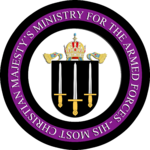 Ministry of the Armed Services |

|
Leo Glores | Solidarity Party | 1 January 2021 - present |
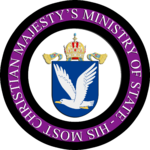 Ministry of State |

|
Gareth Fendara | Solidarity Party | 1 January 2021 - present |
 Ministry of Administration of the Realm |

|
Anaroia Annán | Solidarity Party | 1 January 2021 - present |
 Collegium Scientificum |

|
Fr. Seán Fox, OFM | Non-partisan | 29 April 2013 - present |
 Ministry of the Environment and Energy |

|
Ferínaco Colò | Solidarity Party | 1 January 2021 - present |
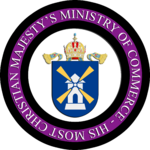 Ministry of Commerce |

|
Michael Maruado | Solidarity Party | 1 January 2021 - present |
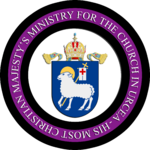 Ministry for the Church in Urcea |

|
Msgr. James Lúcás, SDB | Non-partisan | 18 August 2004 - present |
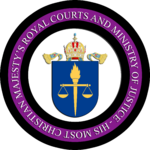 Royal Courts and Ministry of Justice |

|
Archjustice Seán Anmarcus | Solidarity Party | 1 January 2021 - present |
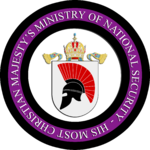 Ministry of National Security |

|
Nica Carmanuel | Solidarity Party | 1 January 2021 - present |
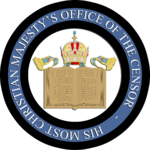 Censor |

|
Aedanicus Gallant | Solidarity Party | 1 January 2016 - present |
 Censor |

|
Victor Fulgentius | Non-partisan | 1 January 2001 - present |